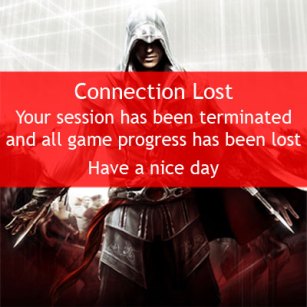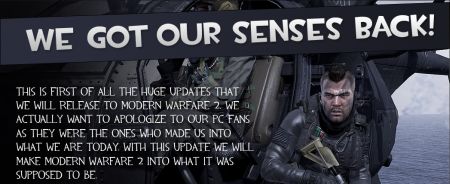Don’t Touch My PC!
Originally written for GameReplays.org and migrated over to Buttered Salami. More information
It’s no secret that a substantial number of PC gamers have felt extremely irritated with the current state of the industry. This irritation has on occasion turned into quite public debacles, the best example being the PC community’s boycott of Modern Warfare 2. So what’s the big deal about? What are PC snobs (like yours truly) so annoyed about
1. “Consolification” of the PC Experience
The PC is an open platform and we like the freedom to customise and fine tune our gameplay experience. Sure you can say that we’re missing out on the “pick-up and go” playability of a console and so should be happy when devolopers cut features. That might work with some, but that mentality won’t get you very far with, lets say, those that hang around ModDB or Crymod.

6,700 Mods and 120 million pageviews… ’nuff said
The fact of the matter is that attempts to “consolify” PC games with systems like IWNet is rarely – if ever – going to elicit a positive reaction. So developers, if you’re going to release a game on PC, please let us keep our developer console, mod support and dedicated servers. With the exception of dedicated servers for multiplayer FPS titles, few will demand to see all of the above features in a title, but strip them all out (*cough*, Modern Warfail 2, *cough*) and the game feels, quite simply, dumb.
We wish, Image credit Mustkunstn1k
2. Digital Rights Management
For many, the immediate response to the words ‘Digital Rights Management’ is to condemn it as the piece of software that is ruining games and will kill the gaming industry once and for all. In essence a reaction best summed up as wanting it to go burn in hell. However, like it or not, piracy is a problem on the PC and consoles (admittedly more so on the PC, but that’s a topic for another day) and for that reason DRM’s existence in principle is justified. What actually bugs us is systems that weaken or completely compromise our ability to enjoy the game we legitimately acquired.
Case in point: Ubisoft’s DRM Online Services Management (as it’s now known) that is currently featured in games such as Assasain’s Creed II and Splinter Cell: Conviction and as per current plans, every future PC release.
Maxime Béland, Splinter Cell: Conviction Creative Lead
“We consider that protecting our PC games is vital to our business and will allow us to continue investing in the development of creative and innovative games on the PC platform”
Yes Maxime, you have every right to protect your product and IP, but all of the “creativity” and “innovation” that goes into your games counts for exactly squat if I’m prevented from playing the damn game! For those unfamiliar with this particular system, whilst ingame you must have a constant connection between you and the Ubisoft servers, so if any of them fail at any time, you’re instantly kicked out of your game without being given a chance to save your game – and you’re banned from playing until a connection is re-established.

FFFFFFFFUUUUUUUUUU
So if you, like me, have a less than perfect ISP or if Ubisoft’s servers go down for any reasons, for example March’s DDoS (Distrubuted Denial of Service) attack, then your game’s only purpose is to consume your hard drive space, or perhaps a $60 coaster.
In my humble opinion, is nothing short of utter bullshit; I paid for the game and will not accept a company telling me that denying my ability to play the single-player campaign offline is somehow going to win the war against piracy.
Ubisoft’s ideas about DRM clearly don’t work, so what does? Whilst no system is perfect, I can safely say that Valve’s DRM system used on Steam is by far the best I have ever used. I can play my games offline and there aren’t any restrictions that have adversely affected gameplay.
The solution to the DRM debate lies with both the developers and the consumers. The former need to put an end to restrictive DRM that kills the gameplay experience and the latter need to change some of their habits and responses.
By all means join sites like DefectivebyDesign.org to keep yourself informed, but please, please don’t pirate games to try to make a point or to “get your own back”. Hell, don’t pirate them at all. I really can’t stress this enough; the only thing you’ll achieve here is to make the situation worse. Just vote with your wallets and don’t buy games that feature unacceptable DRM systems.
3. Ports
Game development is becoming more and more expensive. For example, Metal Gear Solid 4 is rumored to have cost $50million to develop and $10million to market. Thus multi-platform releases are going to become far more common as developers and publishers seek to improve their bottom line. However, what they so often forget when porting titles to PC is that there are a number of signficant differences between how they are played.
Firstly the mouse and keyboard combination offers a much greater degree of precision and versatility than a controller. This difference is most evident in games where the gunplay is designed to be challenging, for example Splinter Cell: Conviction.The game’s stealth gameplay works reasonably well on the xBox 360 (as reliable sources tell me), but on PC the shooting mechanics are so pathetically easy that the concept of stealth becomes nothing more than a joke. This, combined with the aforementioned DRM that gives me a 50/50 chance of getting ingame every time I double-click the icon, was the final straw. I sent the game back to the store and spent my money on something more worthwhile.
The second difference is the distance from the screen. The majority of PC gamers will play on a desk with the screen not more than a few inches infront of them, console gamers on the other hand are likely to sit on a sofa several feet away from the TV. The key difference here? Since we’re closer to the screen, we can see more details on it and individual elements don’t need to be as large.
This brings me onto my next point – how a game can be ported properly to PC? It really isn’t that difficult – Mass Effect’s PC version, for example, featured a custom designed HUD and the mouse and keyboard controls fit the game so well that calling it a port would be simply degrading to the effort BioWare put into properly transferring the game.
Proper keyboard and mouse controls, a clear, useful HUD, and I really couldn’t care less that the game wasn’t originally designed for the PC
Very simple lessons to be learned here, moving a game straight from a console to PC without even the slightest change to the gameplay or interface rarely works. There are differences between the two platforms and it’s about time that more developers acknowledge this and make the simple changes necessary to adapt the title to PC properly.
4. Optimisation
Whilst this grievance could potentially apply to any game on any platform, i’ve yet to see a console title optimised as poorly as some of the absolute shockers the PC has seen – GTA IV or STALKER: Shadow of Chernobyl anyone? The reason for this divide is quite simple; consoles have fixed hardware specifications and as a result, developers only have to optimise games until they run properly. A PC, on the other hand, has no hardware cap – hence many have been able to get away with shoddy optimisation by inflating the system requirements.
Now, unless your name is Cevat Yerli and/or your game pushes technical boundaries, we’re not going to spend hundreds of dollars upgrading our rigs every year to suit developers’ laziness as believe it or not, most of us don’t have money falling from the sky. If we look at the PC releases that have achieved commercial success over the last few years, you’ll find that they all have something in common. The cost of the hardware needed to play the game well has mostly been between $500 and $700, and with that we have a proven benchmark to aim for.
So, to the developers who don’t consider optimisation of much importance: please put the effort and get mainstream titles into that cost benchmark, it’s far more likely to achieve commercial and critical success if you do.
Conclusion
To quote an ancient adage: “you can fool some of the people some of the time, but you can’t fool all of the people, all of the time”. So devolopers, I know you’re more than capable of porting a game to PC without sacrificing quality. Please, put in the effort necessary to make the game enjoyable on all platforms it will be played on – trust me, you’ll reap the rewards.

